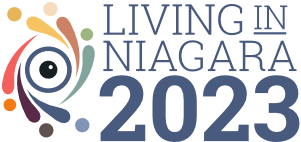Note to Reader: Information in this Sector often includes the acronym HNHB LHIN, referring to the Hamilton Niagara Haldimand Brant Local Health Integration Network. Information about the HNHB LHIN can be found at: http://www.hnhblhin.on.ca/home.aspx
Perceived Ratings of Mental Well-Being and Stress
When asked about perceived health and perceived mental health, individuals in the Niagara Region reported 58.8 in very good or excellent perceived health, with 75% stating very good or excellent perceived mental health. It was also seen that 22% of respondents rated their perceived life stress as high. These figures are generally in line with the overall Canadian and our local LHIN Averages.


Source: Canadian Community Health Survey, Statistics Canada, 2011/2012., CANSIM table no(s).: 105-0502, 105-0592
Retrieved From: http://www12.statcan.gc.ca/health-sante/82-228/details/page.cfm?Lang=E&Tab=1&Geo1=HR&Code1=3546&Geo2=HR&Code2=3504&Data=Rate&
SearchText=niagara&SearchType=Contains&SearchPR=01&B1=All&Custom=&B2=All&B3=All
Obesity Rates in Niagara
Body mass index (BMI) is a method of classifying body weight according to health risk. According to the World Health Organization (WHO) and Health Canada guidelines, health risk levels are associated with each of the following BMI categories:
- normal weight = least health risk;
- underweight and overweight = increased health risk;
- obese, class I = high health risk;
- obese, class II = very high health risk;
- obese, class III = extremely high health risk.
In this measure we see that overweight and obese ratings were given by 59% of the respondents.

Source: Canadian Community Health Survey, Statistics Canada, 2011/2012. CANSIM table no(s).: 105-0502, 105-0592
Retrieved from: http://www12.statcan.gc.ca/health-sante/82-228/details/page.cfm?Lang=E&Tab=1&Geo1=HR&Code1=3546&Geo2=PR&Code2=01&Data=Rate&SearchText
=Niagara&SearchType=Contains&SearchPR=01&B1=All&Custom=&B2=All&B3=All
Prevalence Rates of Chronic Conditions in Niagara
The Canadian Community Health Survey outlined that in Niagara 21.2% of individuals reported having arthritis; 8.7% reported diabetes: 9.2% reporting having asthma; 18.4% reported high blood pressure and 8.6% reported a mood disorder.

Other data from Statistics Canada provides insight into the hospitalizations for specific conditions including stroke, heart attacks and injuries which are detailed below.
Hospitalization for Stroke
Stroke is one of the leading causes of long-term disability and death. Although strokes admitted to a hospital do not reflect all stroke events in the community, this information provides a useful and timely estimate of the disease occurrence in the population.
Health Conditions: Hospitalized Stroke Event Rate (per 100,000 population) By Sex, 12 Years and Over, Hamilton Niagara Haldimand Brant (Health Region), Ontario and Niagara Regional Area Health Unit (Health Region), Ontario

This is a vertical bar graph comparing rates of ‘hospitalized stroke event rate’ by sex, 12 years and over, Hamilton Niagara Haldimand Brant (Health Region), Ontario and Niagara Regional Area Health Unit (Health Region), Ontario.
Hamilton Niagara Haldimand Brant (Health Region), Ontario
- Total: 115
- Male: 133
- Female: 99
Source: Discharge Abstract Database (DAD), CIHI, April 1, 2011 to March 31, 2012.
Retrieved From: http://www12.statcan.gc.ca/health-sante/82-228/details/page_Figure.cfm?Lang=E&Geo1=HR&Code1=3504&Geo2=HR&Code2=3546&Data=Rate&SearchText=Niagara%20Regional
%20Area%20Health%20Unit&SearchType=Contains&SearchPR=01&B1=All&Custom=&Profile=2000&Age=1&LineID=2775
Related data: Hospitalized stroke event rate
Acute Myocardial Infarction
AMI is one of the leading causes of morbidity and death.Although this rate does not account for all AMI in Niagara it does provide an overview of the issue that we have higher rates of AMI in Niagara than in the rest of the HNHB LHIN.
Health Conditions: Hospitalized Acute Myocardial Infarction Event Rate (per 100,000 population) by Sex, 12 Years and Over, Hamilton Niagara Haldimand Brant (Health Region), Ontario and Niagara Regional Area Health Unit (Health Region), Ontario

Niagara Regional Area Health Unit (Health Region), Ontario
- Total: 263
- Male: 365
- Female: 177
Source: Statistics Canada
Retrieved From: http://www12.statcan.gc.ca/health-sante/82-228/details/page_Figure.cfm?Lang=E&Geo1=HR&Code1=3504&Geo2=HR&Code2=3546&Data=Rate&SearchText=Niagara%20Regional
%20Area%20Health%20Unit&SearchType=Contains&SearchPR=01&B1=All&Custom=&Profile=2000&Age=1&LineID=2810
Other leading causes of hospitalization which indicate the presence of chronic disease in the community can be found on the Niagara Region Public Health website at the following link.
Source: Niagara Region Public Health (NRPH)
Retrieved from: http://www.niagararegion.ca/health/statistics/injury-death/hospitalization.aspx
Injury Rates
Health Story of Niagara
According to the Health Story of Niagara by the Niagara Public Health Region, every ten minutes someone visits an emergency department in Niagara because of an injury, despite approximately 95% of all injuries being predictable and preventable.
Injuries can be seen in 2 categories: Unintentional injuries include motor vehicle collisions, falls, sport injuries and unintentional poisoning. Intentional injuries include those resulting from violence.
In Niagara region, falls are the number one cause of injury for those ages 0-14 and over 60, while motor vehicle collisions are the leading cause of injury for people aged 15-59.
The following chart compiled by Niagara Region Public Health helps to highlight the issue related to injuries in the Niagara Region.

For more information on injury rates in Niagara please visit the NRPH website
Injury Hospitalization
This measure contributes to an understanding of the adequacy and effectiveness of injury prevention efforts, including public education, product development and use, community and road design, and prevention and treatment resources (CIHI, 2013)
Health Conditions: Injury Hospitalization (per 100,000 population) by Sex, 12 Years and Over, Hamilton Niagara Haldimand Brant (Health Region), Ontario and Niagara Regional Area Health Unit (Health Region), Ontario

Niagara Regional Area Health Unit (Health Region), Ontario
- Total: 492
- Male: 555
- Female: 423
Source: Statistics Canada
Retrieved From: http://www12.statcan.gc.ca/health-sante/82-228/details/page_Figure.cfm?Lang=E&Geo1=HR&Code1=3504&Geo2=HR&Code2=3546&Data=Rate&SearchText=Niagara%20Regional
%20Area%20Health%20Unit&SearchType=Contains&SearchPR=01&B1=All&Custom=&Profile=2000&Age=1&LineID=2845
Cancer Rates in Niagara
The following table provides an overview of death rates by specific medical conditions. The specific conditions with data include cancer, circulatory diseases, respiratory diseases as well as unintentional injuries, suicide and HIV. The leading cause of death is ischemic heart disease. This data also demonstrates that lung and colon cancer are the top 2 cancer related deaths.

Source: Statistics Canada Health Profile
Retrieved from: http://www12.statcan.gc.ca/health-sante/82-228/details/page.cfm?Lang=E&Tab=1&Geo1=HR&Code1=3546&Geo2=HR&Code2=3504&Data=Rate&SearchText=niagara&SearchType=
Contains&SearchPR=01&B1=All&Custom=&B2=All&B3=All








